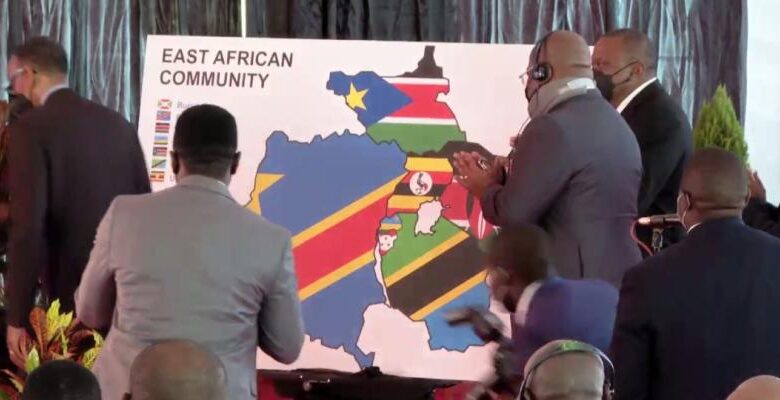Citizens Kick Against EAC Decision To Deploy Regional Force To Eastern DR Congo
The leaders of the East African Community (EAC) had on Monday, June 20 decided at a meeting in Nairobi, Kenya to deploy a regional force to the troubled Eastern DR Congo.

Residents of eastern Democratic Republic of Congo have kicked against the decision of the leaders of the East African Community (EAC) to deploy a regional force to the three provinces concerned.
The three provinces concerned are Ituri, North Kivu, and South Kivu. The people say they prefer a reformed and reinforced Congolese national army, FARDC, in their provinces.
The EAC leaders had, on Monday, June 20, in Nairobi, Kenya, agreed, among other decisions, to deploy a regional force to the troubled provinces in DR Congo as a way of finding a lasting solution to the armed conflicts there.
“We vigorously reject this project and call on you to denounce it,” the Movement for Change, popularly known as LUCHA, declared in a letter to President Felix Tshisekedi on Tuesday, June 21.
“At least three of the seven-member states of the EAC, namely, Rwanda, Uganda and Burundi, are involved for over two decades in the destabilisation of our country through direct interventions of their armies or armed groups,” the LUCHA letter to President Tshisekedi went on, adding that their rejection of any foreign forces on their territory is based on “security, economic and geopolitical reasons”.
Before the meeting of EAC leaders on Monday, DR Congo had indicated its opposition to the participation of Rwanda in any regional force because, according to the DR Congo presidency, Rwanda has resorted to aggression against Congo by supporting the M23 rebellion.
Rwanda has consistently debunked this accusation.
“Placed under the military command of Kenya, this force should not contain elements of the Rwandan army,” the DR Congo presidency declared during the Nairobi meeting on Monday.
Kenya has not given any precision about the composition of the force deployed in Ituri, North Kivu and South Kivu.
Congolese are already voicing their dissents against the decision.
“I am against, really against this force,” said Tito Rushago, a vendor on the street of Goma.
“There are all countries here, Senegal, Tanzania, Uruguay, whose presence in the country for the past 20 years has changed nothing,” declared Patrick Bahati about the United Nations Organisation Stabilisation Mission in DR Congo (MONUSCO).
Alfred Kenye, a businessman, promised to participate in demonstrations against the presence of the impending force, while Patrick Hamuli called the deployment of the party “a betrayal”.
Most Congolese who spoke to HumAngle said they preferred the national army; FARDC is reinforced, reformed, and the soldiers are well paid.
They also said the soldiers should have the necessary rations while the “corrupt officers profiting from the war should be replaced”.
“I doubt the efficacy of this force,” James Biensi, a pastor in the Eglise Francophone CECA 20 in Bunia, Ituri province. Biensi said he suspected a hidden agenda behind the deployment of the force.
“The countries concerned do not agree among themselves,” the pastor said, adding that even MONUSCO has not succeeded in bringing peace to the eastern DR Congo.
“I am sceptical over the operationality of a force constituted of countries that have their interests in our country,” said Raphael Wekenge, coordinator of the Congolese Coalition for Transitional Justice based in Bukavu in South Kivu.
For Paulin Mulume of the Collective of Citizen Movements of Congo, the decision to deploy foreign forces is regrettable.
“We have already had several joint operations in the eastern part of the country which have not borne any fruits, with some even leaving bad memories among the people,” Mulume said.
“We do not know what has pushed our president to be involved in this affair. It had to pass through the parliament. We hope he would eventually regain his reasoning,” chipped in Judith Maroy of LUCHA in South Kivu.
In Bukavu, Dr Denis Mukwege, who received the Nobel Peace Prize in 2018 for his actions in favour of women victims of rape used as a weapon of war, last week indicated his opposition to the deployment of “a regional force composed of countries responsible for the destabilisation, atrocities and looting of our resources”.
“The force would bring neither stability nor peace and risks aggravating the situation,” Dr Mukwege said, calling for a reform of the FARDC.
Support Our Journalism
There are millions of ordinary people affected by conflict in Africa whose stories are missing in the mainstream media. HumAngle is determined to tell those challenging and under-reported stories, hoping that the people impacted by these conflicts will find the safety and security they deserve.
To ensure that we continue to provide public service coverage, we have a small favour to ask you. We want you to be part of our journalistic endeavour by contributing a token to us.
Your donation will further promote a robust, free, and independent media.
Donate HereStay Closer To The Stories That Matter




